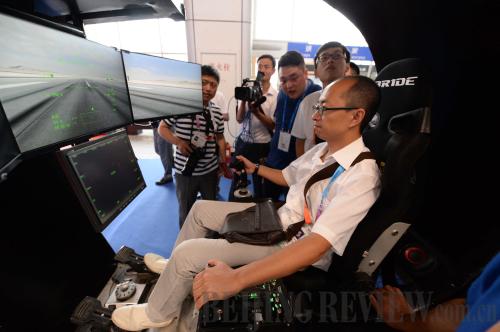|
 |
|
PILOT PROGRAM: A visitor experiences a flight simulation during the First China-Russia Expo in Harbin, capital of Heilongjiang Province.The expo, lasting from June 30 to July 4, attracted a total of 1,597 domestic and foreign companies (WANG KAI) |
Fiscal Reform
China will endeavor to build a comprehensive, transparent and efficient fiscal and tax system by strengthening reforms in the coming years, the central leadership of the Communist Party of China (CPC) said on June 30.
Priorities include improving management and supervision of government budgets, facilitating the building of a comprehensive, well-regulated and transparent modern budget system and optimizing the tax system, said a statement released after a meeting of the Political Bureau of the CPC Central Committee, presided over by its General Secretary Xi Jinping.
High priority will also be given to adjusting powers and spending responsibilities held by central and local governments, and adjusting the distribution of revenue between them while keeping the current division of financial resources between the two parties stable, it added.
A framework plan for reinforcing China's fiscal and tax system reforms was reviewed and agreed upon at the meeting.
The goal of the reforms is to set up a unified, comprehensive, well-regulated, open, transparent and efficient modern fiscal system that is conducive to better resources allocation, social equality and national stability, according to the statement.
It noted that China aims to fulfill key tasks in the new round of fiscal and tax reforms by 2016, and establish a basic modern fiscal system by 2020.
FTA Takes Effect
Free trade agreements between China and Switzerland and China and Iceland took effect on July 1, marking a new dawn for business between the countries.
The agreements, which apply a zero-tariff policy to a wide range of merchandise, cover areas including government procurement, employment cooperation and intellectual property.
Under the agreement, 99.7 percent of imports from China to Switzerland will be exempted from customs duties, while 84.2 percent of Switzerland's exports will enjoy the same policy. Duties on China's exports including textiles, clothes, auto parts and metalware will be reduced substantially.
Trade between China and Switzerland increased 126 percent year on year to $59.5 billion in 2013. China is Switzerland's largest trade partner in Asia, while Switzerland is China's fifth largest trade partner in Europe.
Trade between China and Iceland stood at $220 million last year.
PMI Rebound
Growth in China's manufacturing sector accelerated to a six-month high in June, registering a strong end to the second quarter and an encouraging sign that the economy is further stabilizing.
The purchasing managers' index (PMI) rose to 51 in June, up from 50.8 in May and the highest since December, according to data released by the National Bureau of Statistics (NBS) and the China Federation of Logistics and Purchasing.
A reading above 50 indicates expansion, while a reading below 50 reflects contraction.
This is also the fourth monthly rise of the PMI, a widely watched indicator for the health of the world's second largest economy, which registered a weak start at the beginning of the year and stirred much market concern.
"The continuous rises in PMI indicate that a trend of stable economic growth has generally been established," said Zhang Liqun, a researcher at the Development Research Center of the State Council. "The policy measures aiming to stabilize growth have had the desired effect," he added.
China's non-manufacturing PMI dropped to 55 points in June from a six-month high of 55.5 in May.
| 